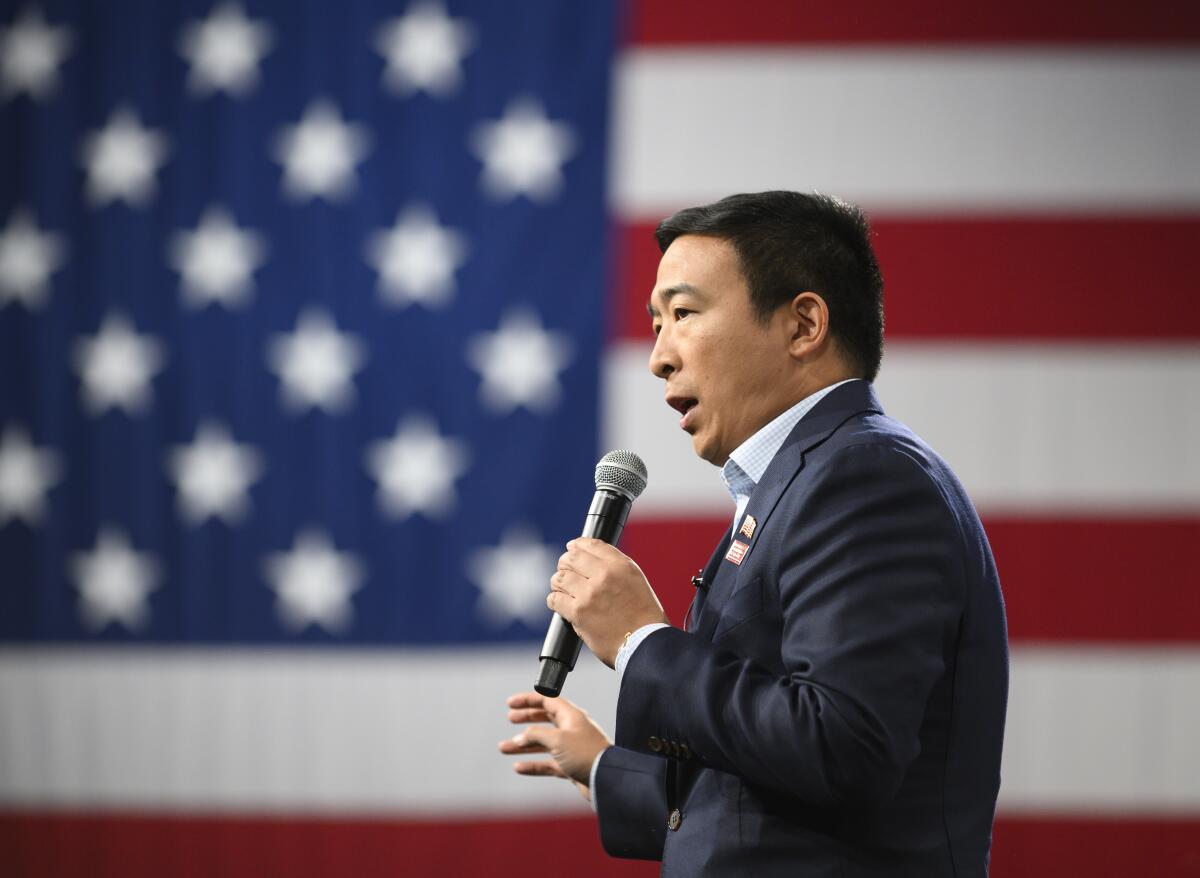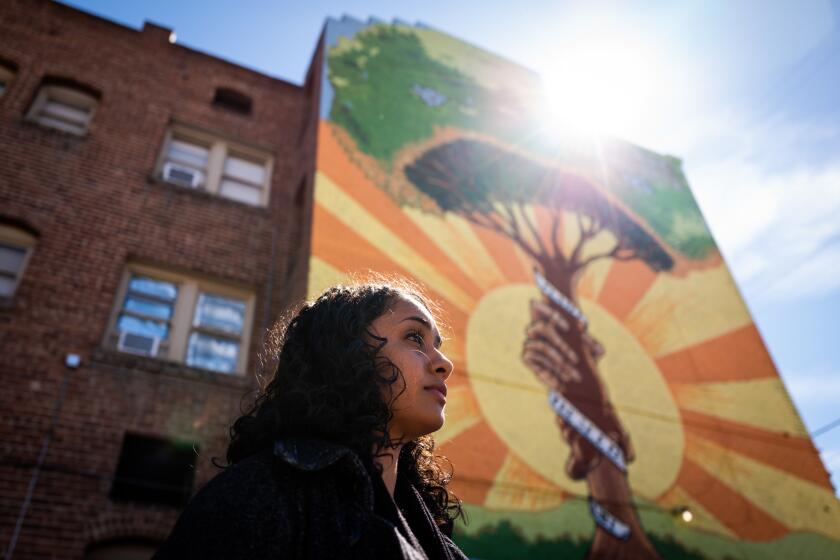Andrew Yang wants to give you $1,000 a month

KEENE, N.H. — Andrew Yang travels around the country warning of a dystopian “Mad Max”-like future, yet dropping dry one-liners along the way like he’s at a comedy open-mike.
His approach — doom and dad jokes, plus his promise to give every American adult $1,000 per month — are increasingly winning the Democratic presidential candidate the favor of a small but vocal segment of voters. The New York entrepreneur has surpassed several better-known rivals in polls and is sure his quixotic campaign is surging.
“I’m like Arcade Fire, circa 2006 … before they became cool,” Yang told more than 100 supporters at Keene State College in New Hampshire, drawing laughs as he compared himself to the now-famous band. “This is the indie show; I hope you feel it. You’ll be like, ‘Oh, I saw him in Keene.’”
The support for Yang’s single-focus campaign — he wants to create a national universal basic income to counter the impacts of automation — is lodged in the single digits in the polls. But that and robust contributions from small donors have been enough to get him a spot at every Democratic debate — including the one Thursday in Houston, where some sitting lawmakers failed to make the stage.
Yang used his opening statement to announce his campaign would be giving 10 families $1,000 per month for a year to demonstrate how his so-called freedom dividend would work, stunning at least one of his rivals on the stage.
“It’s original, I’ll give you that,” South Bend, Ind., Mayor Pete Buttigieg said.
Andrew Smith, a political science professor at the University of New Hampshire, said that originality is the draw of Yang’s campaign.
“He’s a complete breath of fresh air compared with the other candidates. People who aren’t schooled in politics often make much more entertaining candidates,” Smith said. “I think he’s not likely to make it through the wringer all the way to the end … but he’s a good summer story.”
Yang’s supporters — a fervent group known as the “Yang Gang” — draw comparisons to Vermont Sen. Bernie Sanders’ “Bernie bros” and, in a past campaign, former Texas Rep. Ron Paul’s “Revolution.” The 44-year-old Yang is a favorite of Silicon Valley, winning the backing of tech leaders such as Tesla Chief Executive Elon Musk, whose work is accelerating automation. The candidate attracts large crowds of young, ideologically flexible voters who are sick of establishment politics.
They are obsessively devoted defenders of their candidate online and in person. One asked Yang to autograph his forehead with a Sharpie. Another had a cartoon version of Yang’s face tattooed on his calf.
Kyle and Nicole Pinette of Concord recently changed their voter registration from Republican to Democratic so they could vote for Yang in New Hampshire’s February primary. Nicole, 32, supported Donald Trump in 2016, and Kyle, 34, chose Hillary Clinton after voting for Sanders in the primary.
“He’s more forward-looking, especially on technological issues,” Kyle, a software engineer, said after seeing Yang speak in Laconia. “And he’s the only candidate talking about the issue of automation, which I think is going to blindside the country, or the world.”
Sarah Schiffman, who had Yang autograph her favorite bong in Laconia, agreed. “For the first time in my life, I honestly don’t feel like I’m being lied to,” said Schiffman, 28, who does outreach to sex workers. The Columbia premed student backed Sanders in 2016.
Yang also backed Sanders three years ago, he points out often as he courts the senator’s supporters.
“I’m younger, fresher, more modern, more Asian, more tech-savvy than Bernie,” Yang told a gathering of college Democrats and Republicans at the University of New Hampshire in Durham.
“I’m like the Bernie of 2020,” he said, a pitch he makes often.
His signature one-liner, however, targets Trump. “We need to do the opposite of much of what we’re doing right now — and the opposite of Donald Trump is an Asian man who likes math.” His supporters frequently chant the latter part of the quip in unison with him.
Yang says he’s best-positioned to pick up disaffected Trump supporters. He cites an Economist/YouGov poll from July that found he and Sanders are the only Democratic candidates to win double-digit support from previous Trump voters.
Yang tells voters that automation of 4 million manufacturing jobs in states such as Michigan, Wisconsin, Ohio and Iowa in recent years led to Trump’s 2016 win.
The president, he said, highlighted the job loss problem, but misplaced the blame. Immigrants are not responsible, Yang said — robots are.
Yang argues that what happened to those displaced workers foreshadows a grim future. Almost half left the workforce. Substance abuse and suicide increased. In 2017, life expectancy in the United States declined for the third year in a row for the first time in a century.
The next wave of automation threatens the livelihoods of millions of truck drivers, retail clerks and call-center employees and will start affecting white-collar workers, Yang says.
Economists debate how great the disruption will be: Some say new types of jobs will be created to replace those that disappear; others contend that the nation is about to be crippled.
Walt Borland, a former CEO of multiple start-ups, credited Yang for raising the issue, though he questioned his proposed remedy. Borland, who teaches a class on the effects of automation on society at the University of Michigan, believes the U.S. is on the verge of a major economic disruption, but he thinks universal basic income would not be a panacea.
“What we really need to be talking about is, what does our future look like and how do we guide people to think about developing useful solutions to the problem?” Borland said.
Yang, whose net worth is estimated in the low seven figures, says society needs to rethink how it values people, productivity and the meaning of work. He said his wife, Evelyn — a stay-at-home mom who cares for their two young sons, one of whom is autistic — works harder than he does, yet her labor has no monetary worth.
“Americans have been brainwashed to think that economic value and human value are the same thing,” Yang told supporters in Keene.
Rather than judging the nation’s strength by its gross domestic product, Yang argues it should be based on data such as life expectancy and the health of the environment — a proposal he reiterated Wednesday at a CNN climate-change forum.
But Yang’s primary solution is a form of universal basic income.
“If you’ve heard anything about me, you’ve heard there’s an Asian guy running for president who wants to give everyone $1,000 a month,” Yang told supporters in Keene. “I know, the first time you hear it, it sounds like a joke. It sounds like a gimmick. It sounds like it’s too good to be true. But you find it’s a deeply American idea.”
The concept has been floating around the United States since its founding, supported by leaders as ideologically disparate as Richard Nixon and Martin Luther King Jr. A version was passed by the House of Representatives in 1970, but failed in the Senate. Now, pilot programs are taking place around the nation, including in Stockton.
Yang does not believe $12,000 a year would fully replace the income lost to automation. But the money would largely be spent in local communities, creating jobs, he says. He proposes other efforts, such as rebuilding U.S. infrastructure and increasing funding for high school vocational education for careers that are difficult to automate, like plumbing.
Yang says he would fund the guaranteed income program by consolidating welfare programs and creating a value-added tax of 10% on the production of goods and services.
Young, sincere and raised on the edge of poverty, Sukhi Samra has a mother who worked two minimum-wage jobs when she was a kid — days at a gas station and nights at a Subway.
James Chase, 27, said when he first heard about Yang’s signature proposal he thought it was “ludicrous.” The Keene resident, a Republican who voted for Trump in 2016, added, “I went to debunk it. But when I looked into it more, I ended up really liking it.”
Chase, who is unemployed, said he’s not thrilled with the turmoil of the president’s tenure, but would support Trump over most of the Democratic field that he views as too liberal — with one exception: “Absolutely I would vote Yang over Trump,” he said.
Yang, the son of Taiwanese immigrants, was raised in Schenectady, N.Y. His father’s physics research at General Electric and IBM resulted in 69 patents; his mother worked as a university administrator. When Yang was a teen, they decided to send him to Phillips Exeter Academy, an exclusive and expensive private boarding school in New Hampshire. (He is not the only 2020 candidate who attended the school: Billionaire Tom Steyer also graduated from Exeter.)
As Yang campaigns here, he frequently highlights his time at the academy as an angsty, grunge-loving, flannel-wearing teenager. David Tsai, a classmate, recalled being amused when Yang got attention for not wearing a tie during Democratic debates.
“I thought it was fantastic he stayed himself,” said the San Francisco tech attorney, recalling Yang getting in trouble for violating their school’s dress code by wearing a trench coat and mock turtleneck to class instead of a jacket and tie. “He was never afraid to just be him.”
After Brown University and Columbia Law School, Yang worked as a lawyer for several months until he realized it made him miserable. He founded one company that failed before leading a test-prep program that was acquired by Kaplan in 2009.
In 2011, Yang formed the nonprofit Venture for America, which trains entrepreneurs to work in beleaguered cities such as Detroit, Baltimore and Philadelphia. The effort earned accolades from President Obama’s White House, but Yang grew concerned that for every job he was creating, tens if not hundreds more were disappearing because of automation. He decided he needed to sound the alarm.
“But my first move was not to run for president, because I’m not crazy,” Yang told voters in Laconia. “I went to Washington, D.C., and I said to our leaders and policymakers: ‘This is the real set of problems. Here’s the data. Here’s a PowerPoint deck. Here’s the math. What are we going to do about it?’”
Yang said officials offered three responses: a refusal to discuss the problem, proposals to study it further, and retraining millions of workers for new jobs.
“The last one sounds halfway responsible,” Yang said, before pointing to studies that found government-funded retraining programs for displaced manufacturing workers had a success rate of 15% or lower. “They’re a total dud and failure.”
So Yang decided to run for president, and announced his bid in 2017; his views on automation, shared in February on comedian Joe Rogan’s podcast, YouTube and social media, attracted a following.
Yang has other ideas , including unusual proposals to get rid of the penny and increase pay for mixed martial arts fighters. But cutting every American adult a monthly check for $1,000 is the core of his message.
“My interest in a political career is moderately low,” Yang said in an interview, eating fistfuls of SkinnyPop as he was driven between a college rally and a podcast interview. “Because politicians’ jobs seem extraordinarily ...,” he explained with a mild profanity.
But “I want to solve the problems,” he said, “and the easiest, most straightforward, most efficient, direct way for me to solve problems is to run for president and win.”
More to Read
Get the L.A. Times Politics newsletter
Deeply reported insights into legislation, politics and policy from Sacramento, Washington and beyond. In your inbox three times per week.
You may occasionally receive promotional content from the Los Angeles Times.












